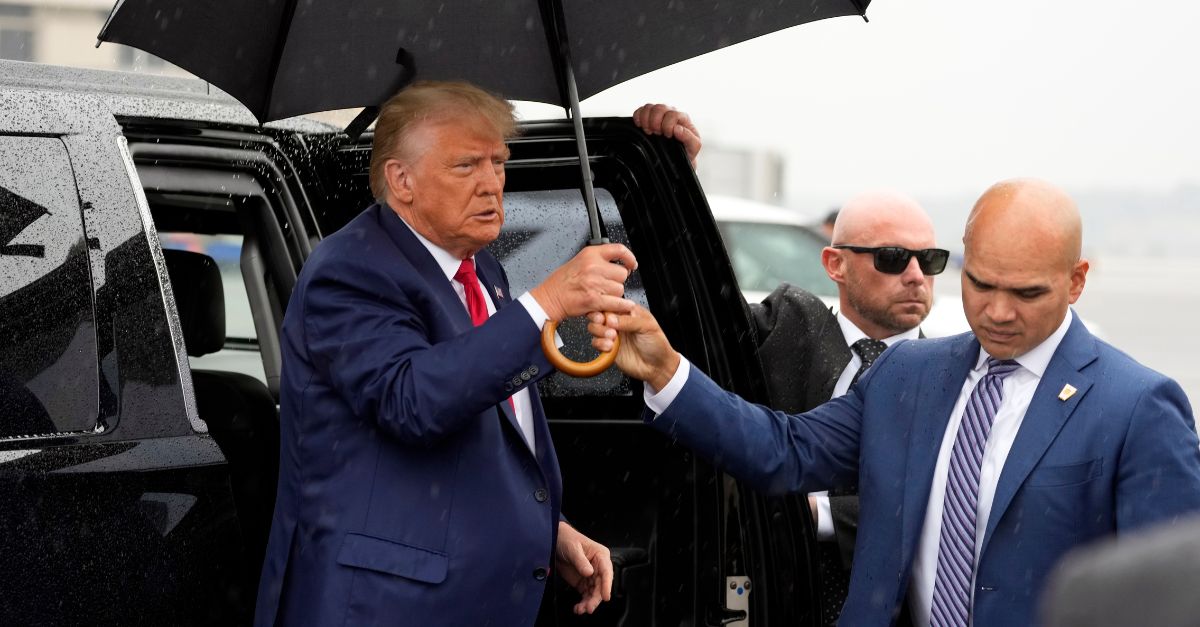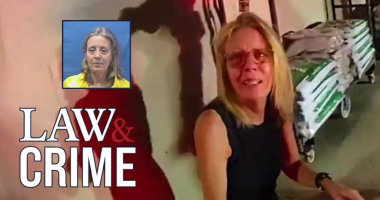
Valet Walt Nauta hands former President Donald Trump an umbrella before he speaks at Ronald Reagan Washington National Airport, Thursday, Aug. 3, 2023, in Arlington, Va., after facing a judge on federal conspiracy charges that allege he conspired to subvert the 2020 election. (AP Photo/Alex Brandon)
A federal court in Washington, D.C., rebuked a co-defendant in the Mar-a-Lago classified documents case over his “patently overbroad” discovery requests for myriad grand jury-related materials.
On April 10, Waltine “Walt” Nauta, former President Donald Trump’s personal valet, filed a series of requests with the U.S. District Court in the nation’s capital related to five separate grand jury subpoenas.
Also on April 10, Nauta asked U.S. District Judge Aileen Cannon to allow additional briefing — from the state and defense — on various issues related to his motion to dismiss for selective and/or vindictive prosecution. The defense aimed to keep the motions on both sides flowing — based, in part, on those requests made to the Washington, D.C., court.
Special counsel Jack Smith, for his part, lambasted Nauta’s early April requests to both courts as an effort to “needlessly drag out the litigation of his pretrial motions” by raising “allegations and arguments for the first time in his reply without good cause.” The prosecution urged Cannon not to allow Nauta to continue filing such motions.
While Nauta and Smith were both allowed to continue briefing on the motion to dismiss by Cannon — filings continued through the end of April — the District Court in Washington, D.C., foreclosed on some of the potential subject matter entirely. And, by issuing such a broad-based denial, it clamped down on what might have been several additional volleys between Nauta’s defense team and Smith’s prosecution.
The court explained its reasoning at the outset in a highly-redacted and heavily-underlined 13-page memorandum opinion.
“Following a grand-jury investigation that began in this district, former President Donald Trump and his aide Waltine Nauta were ultimately indicted in the Southern District of Florida for unlawfully retaining classified documents and obstructing the ensuing federal investigation,” the court’s May 15 order reads.
“In the hope of uncovering additional material that might advance his legal defense, Nauta has now petitioned this Court to disclose and transfer the records of all grand-jury matters related to that investigation to the Florida court presiding over his case, including five specific matters enumerated in his Motion,” the opinion, which will not carry the force of precedent, goes on. “Because that request is patently overbroad — and he has not made a sufficient showing of need as to each enumerated matter — the Court will deny the Motion.”
More Law&Crime coverage: Jack Smith hammers Trump’s valet co-defendant for ‘numerous false factual allegations and meritless legal arguments’ in fiery Mar-a-Lago brief about ‘dilatory tactics’
The court explains that Nauta requested the records of all “grand jury proceedings related to the investigation” of Trump be sent over to Cannon in order for the judge to determine “whether any of those materials should be disclosed to the defendants.”
The court faults the defense request for its basic premise: instead of arguing for unsealing the requested documents and giving them to him, Nauta, rather, wanted the documents sent to Florida because he believes Cannon “is in a better position” to determine the issues.
Notably, the court observes that Nauta did not even bother to address a government motion to keep the documents sealed. Instead, the court notes, Nauta argued such a transfer is “automatic.”
“At a minimum, Nauta must make some threshold showing to this Court that disclosure ‘might be appropriate,”” the court explains. “As explained below, however, it plainly is not.”
More Law&Crime coverage: Defense filing in Trump Mar-a-Lago case says all sides have ‘methodologically proceeded toward trial readiness’ while asking for judge to push back discovery deadlines
Also fatally for the request, the defendant asked for far too much.
The opinion uses withering language to characterize the request:
Insofar as Nauta seeks disclosure of all grand-jury dockets and entries related to the classified-documents investigation, the Court finds that this would be inappropriate because the request is not “structured to cover only material so needed.” He does not ever argue that all such materials would be relevant to his pending motion for discovery or motion to dismiss. Nor could he, because his request extends to matters he knows nothing about. Rather, he imagines that upon transfer to Florida, the court presiding over his criminal case would sift through the records docket by docket and entry by entry, plucking out whatever material it deems relevant to his defense.
“Alternatively, if his request is not transferred, presumably he envisions this Court undertaking that task,” the opinion goes on. “There is a name or such a venture: a fishing expedition. And Rule 6(e)’s grand-jury secrecy provisions forbid it.”
On Aug. 8, 2022, federal agents raided former the 45th president’s Palm Beach compound — part residence; part private club — returning with file boxes upon file boxes containing what federal prosecutors allege were illegally retained classified documents.
Nauta was also named as an original co-defendant. In a superseding indictment, Mar-a-Lago maintenance chief Carlos de Oliveira was added as a co-defendant.
A trial date in the case has been repeatedly delayed.
Have a tip we should know? [email protected]








